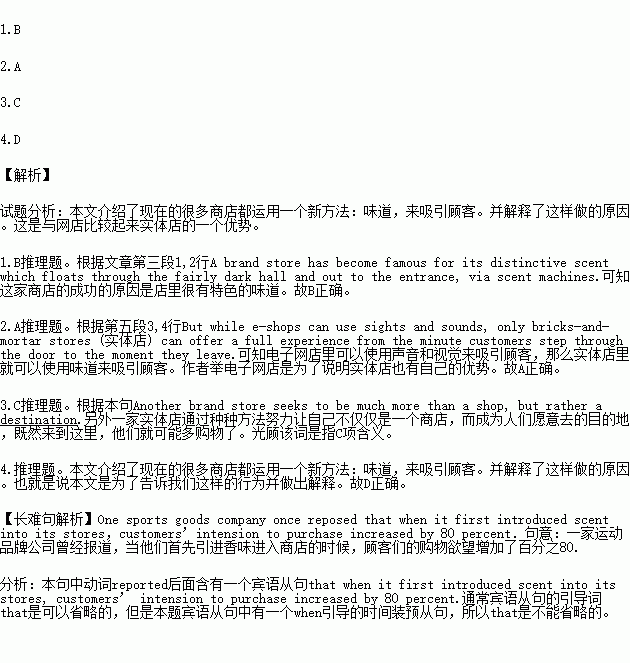题目内容
What is the first thing you notice when you walk into a shop? The products displayed(展示)at the entrance? Or the soft background music?
But have you ever notice the smell? Unless it is bad,the answer is likely to be no.But while a shop’s scent may not be outstanding compared with sights and sounds,it is certainly there.And it is providing to be an increasing powerful tool in encouraging people to purchase.
A brand store has become famous for its distinctive scent which floats through the fairly dark hall and out to the entrance,via scent machines. A smell may be attractive but it may not just be used for freshening air.One sports goods company once reposed that when it first introduced scent into its stores,customers’intension to purchase increased by 80 percent.
When it comes to the best shopping streets in Pairs,scent is just as important to a brand’s success as the quality of its window displays and goods on sales.That is mainly because shopping is a very different experience to what it used to be.
Some years ago,the focus for brand name shopping was on a few people with sales assistants’disproving attitude and don’t-touch-what-you-can’t afford displays.Now the rise of electronic commerce(e-commerce)has opened up famous brands to a wider audience.But while e-shops can use sights and sounds,only bricks-and-mortar stores(实体店)can offer a full experience from the minute customers step through the door to the moment they leave.Another brand store seeks to be much more than a shop,but rather a destination.And scent is just one way to achieve this.
Now a famous store uses complex man-made smell to make sure that the soft scent of baby powder floats through the kid department,and coconut(椰子)scent in the swimsuit section.A department store has even opened a new lab,inviting customers on a journey into the store’s windows to smell books,pots and drawers,in search of their perfect scent.
1.According to the passage,what is an increasingly powerful tool in the success of some brand store?
A.Friendly assistant. B. Unique scents.
C.Soft background music D.attractive window display.
2.E-shops are mentioned in the passage to_____.
A.show the advantages of brick-and-mortar stores
B.urge shop assistants to change their attitude
C.push stores to use sights and sounds
D.introduce the rise of e-commerce
3.The underlined word“destination”in Paragraph 5 means_____.
A.a platform that exhibits goods
B.a spot where travelers like to stay
C. a place where customers love to go
D.a target that a store expects to meet
4.The main purpose of the passage is to________.
A.compare and evaluate B.examine and assess
C.argue and discuss D.inform and explain

